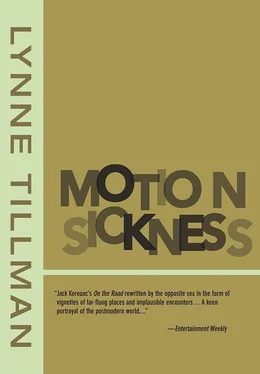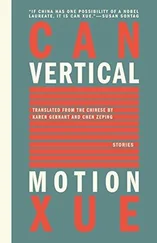Which is probably why we fuck most of the time. In this we’ve both become compulsive. His hand is on my lap or on my thigh no matter where we are. At a movie he throws his coat over me so that he can hold my breast and then slip his finger into my vagina. We rush back to the guest house, and fuck till we fall asleep. In the morning it begins again. Zoran is as good a lover as he was a sightseer in Venice. Here, with me, he doesn’t sightsee. He says, with a deep sigh, I am too involved to think. I’m supposed to be flattered.
Our Mrs. Kovacs makes herself scarce. She doesn’t go in for jokes, the way Signor Mancini did. That fascist Mancini, I can hear Claudia say, then see Claudia spit into the sink of the coffee shop on the Moscow Road. Mrs. Kovacs didn’t introduce herself as “Kovacs, not related to Ernie.” She just makes herself invisible or squirrels around the apartment. Maybe she’s standing behind a door. Or in the shadow in the hallway, standing in the shadow of love. I hear doors closing and opening, thin squeaky noises. She puts on bedroom slippers when she comes indoors and pads around the living room. She may be listening to our moans and grunts. I clap my hand over Zoran’s mouth, he grabs my arm and twists it behind my back. I bite him hard on his shoulder, he pins my other arm down. He won’t come unless I come. His insistence, which was at first a sign of sexual compassion and urgency, has become the tactics of a cold war warrior meant to win a wordless battle.
I’m on a roller coaster with Zoran, whose light blue eyes are encircled by coffee-colored rings. “Because of you,” he says. “l can’t sleep. I can’t even smell you anymore,” he complains. “We have the same smell. You and I. We are the same.” Perhaps that’s why we fight so much more these days, gripped by the sense we’re falling into a time before words and mirrors surfaced to key us to our separate identities. I can smell myself, I tell him. I can smell my cunt all the time. Even reading or drinking coffee in a café, I can smell it. When Zoran is at the guest house or walking near the Danube, I know he’s not with me. Perhaps I have been kidnapped and thrown into a story I’d never read or want to see on the screen’ Or maybe I would want to see it. I like romance at a distance.
I know of an Englishman who once attempted invisibility but was not as successful as Mrs. Kovacs. He had a suit made of the same pattern as his wallpaper. He put it on and stood against the wall of his room and called for his landlady. What are you doing up against that wall? she asked. Zoran laughs in a raucous way and I like him again. We get dressed. Mrs. Kovacs hovers near the kitchen as Zoran and I rush to find a cab, to go anywhere. Some kids point at our driver and shout, KGB, KGB. They know you’re American, Zoran says perfunctorily. They tease you.
I don’t know why we’re taking a cab. I suppose we’re both exhausted. I tell Zoran a story, the same one I told Charles in Istanbul. I tell it almost the same way, too, as if it’s already a myth. I once saw a man coming out of an elevator in downtown Manhattan. I didn’t know who he was but his face reminded me of someone, someone I knew. Standing next to me another man said hello to the stranger who just shook his head up and down in return. I asked the man beside me, Who is he? He looks so familiar. That’s Ethel Rosenberg’s brother, David Greenglass, the man replied. He’s worked in this building for years. We didn’t speak after that, waiting for the elevator; it was eerie. I look at Zoran. He seems to appreciate the story and puffs hard on his cigar. The Rosenbergs have never, to my knowledge, been defended, I explain to Zoran, the way Blunt and the Cambridge spies were. That’s because, he interrupts, the British are British. I go on, No one, their supporters, I mean, maintains they did it because they were Communists and obeyed their conscience, not country. The taxi driver looks in his back mirror and Zoran shoves my arm and whispers loudly, CIA, CIA. The cabdriver laughs. Zoran sighs, You think too much about betrayal and loyalty. A little later, seated in another café, looking up from his newspaper, he complains, You are like all Americans. There is no way that I can say to him, You are like all Yugoslavians, as I have no idea what all Yugoslavians are like.
To Zoran with his impossibly high standards everything is corrupt but sex. Sex and Renaissance art, the paradisiacal moment he looks back to as if it had escaped the forces of history nothing else does. We mostly agree about America’s images of freedom and the rhetoric that makes America America, constructs it, but Zoran sees evil everywhere, in every bit of American life, which he appreciates for its vulgarity. We argue about popular culture and television. He sees mass culture as something that can only bring the masses down. With our differences brandished we challenge and frustrate each other. When things hold together or fall apart, the forms are familiar. The conventions — as well as the anomalies — control our ability to imagine different arrangements. Zoran and I have become mired in arguments and positions neither of us, I bet, truly supports. But daily what we actually support and what we find ourselves defending grow more ridiculous. I defend Hollywood movies as if their contradictions really were heroic, and he defends censorship or government intervention without a trace of irony.
He’d like to undo me. I’d like to undo him. I’d like to build a Berlin Wall that places me in the East and him in the West. As for American vulgarity he makes small exceptions. He says he loves me, even though I drive him crazy. I never tell him I love him, and he says he knows I do, but I’m too young to appreciate it. One of his newer verdicts about me. I tell him he’s an elitist. He smiles gravely. Perhaps I’ve wounded him. I’d like to. Did you sleep with that invisible Englishman? he asks.
If this were a comedy Zoran might be a cranky but charming Eastern bloc intellectual on vacation. I’d be sort of bumptious and well-intentioned, a well-off, but not really rich, white American, condemned to a circle of hell Dante never wrote — reserved parking for the naive whose naiveté is laced with masochistic hope. And privilege, he always says, don’t forget that. You Americans are hopeless, he also says. History is full of Watergates. Your people are always so surprised at conspiracy. My people. Our comedy will be short-lived. But the comic will be devastatingly apparent, I think, only later when I examine life without Zoran, even though he and I are still determined to go to his country and this seems less likely every day. But Zoran refers to it, a kind of marker or signifier of progress.
There is no progress, there is repetition. John the New Zealander was very fond of saying that, but I wouldn’t tell Zoran because then he’d ask me about John and get possessive and jealous in the most so-called reactionary way.
TANGIER
A long time ago a young woman from France or Germany or Great Britain arrived here on the start of a journey. She left home to travel when travel was hard and when few women traveled alone. Or at all. I can see her. In a long brown skirt of durable material, a dark jacket, sensible shoes, a broad-brimmed hat and a scarf, she is tall and solid, short and slight, blond, dark. She does not fall in love with anything but adventure. Adventure is to her what Jesus is to nuns — the true marriage partner — and she dedicates her life, her being, to this fascinating mate. Remarkably resilient, carrying a map and compass, and only one leather suitcase, she enters Tangier on the beginning of a journey that will be her life and over many many years she loses touch with everyone she ever knew. Or her father dies, her brother marries, her mother dies, her friends marry, her lover gives up hope of her coming back and marries her cousin, and one girlfriend, who teaches school, lives out her life as a spinster, a woman with a secret, and only she keeps in touch with her. Or, no one reaches her, she breaks off relations completely, and were she to hear that her father died, it would not touch her. She ends in the desert, knowing the ways of the Bedouin, or she ends near the jungle, or she uses her inheritance to buy a large house where she lives simply and learns to fly a plane and becomes a mail carrier. Or she is desperately poor, having given her money away, and exists as an oddity in the village or town that tolerates her eccentricity. Or she trains chimpanzees to follow her as she walks around the grounds of her estate. She is Freya Stark, the writer and traveler, who urges you to “let yourself go on the stream of the unknown.” Or she is Isabelle Eberhardt who dresses like a man, and is hungry for love, for adventure, always hungry. Or she is a character like Kit Moresby in Paul Bowles’s The Sheltering Sky who goes mad and wanders in the desert forever, forever untethered.
Читать дальше












